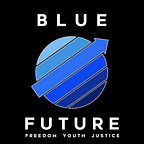A Spring for Progress: My Experience as a Blue Future Organizer
By Ndidi Opara, Blue Future Spring for Progress and Change organizer
As a youth organizer, you expect to have to create a seat at a table that never tried to make room for you in the first place. You expect to be silenced before you even speak. Blue Future’s mission is a ray of hope for organizers like me who have never had their voices listened to.
Blue Future’s Spring program equipped me with the skills and tools to effectively communicate and advocate within my community. From learning about the importance of following up and relational organizing to learning about deep canvassing, I am walking away from my ten weeks spent in the program with so much more knowledge on how to connect with people on a political level.
This goes to show yet another takeaway I gained from my time as a Blue Future organizer — no matter how much we realize and idealize the world we want to see, we cannot get there unless we take action towards it. Blue Future gave me the opportunity to one, learn about the importance of some of the issues that we face in our nation, and two, take action and advocate for specific issues in a variety of ways. We were invited to volunteer in many ways including phone-banking, writing letters to the editor, or creating social media posts. I’m grateful that a multitude of volunteer opportunities were available to the program, as it was a great way to highlight the many strengths that our cohort had.
Along with this, the fact that all of these opportunities were online and accessible served the needs of our cohort. Community organizing and political volunteering is now more accessible than ever; Blue Future made organizing and volunteering even more accessible by paying us to spend our time organizing and volunteering. Blue Future’s program further highlighted the need to pay young people in politics, even in unprecedented times such as these. And while virtual advocacy is accessible, it can be draining to spend hours at a screen. Blue Future weekly training’s were spaces that encouraged self care and the fact that you cannot advocate for others before you advocate for the needs of yourself.
As a High School Senior that’s new to organizing and hopes to make it a career, I’ve gotten used to doing the dirty work. I’ve been used to not getting adequately compensated for the time I spend organizing for my community. I’ve been used to eventually growing resentful of the spaces I am a part of because I don’t feel supported. Blue Future taught me that in a field like organizing, one that takes your all, you cannot allow yourself to not ask for anything emotional or personal in return.
This is all to say that my 10 weeks with Blue Future were nothing like any other experience that I have had as an organizer thus far. I am grateful for all that I learned over the course of these weeks. I am grateful for the music at the beginning of our trainings. I am grateful for the supportive group of local organizers I became a part of. I am grateful for getting to hear monumental legislators speak to us as equals. I am grateful for the birthday celebrations in our message threads. I am grateful for the connections I’ve made. And lastly, but certainly not least, I am grateful for Blue Future.
…
About Ndidi: Born in California, raised in Arizona and based in the East Seattle Suburbs, Ndidi Opara (she/her) is chasing a change-oriented world one community at a time through outreach and community-based organizing. Outside of public policy and communications, she loves all things music, media journalism and fashion. She currently serves as her school’s ASB President, the Communications Lead for Emerald Youth Organizing Collective, writes for StudentVoice and the Institute for Youth in Policy, and has research published on the Colorline in Rap music and advocacy.
